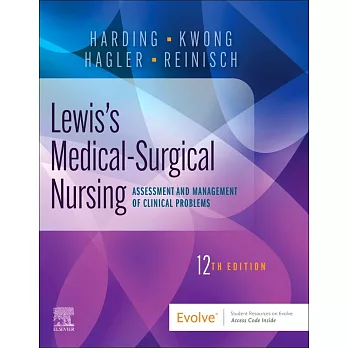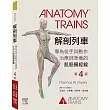全球領先的內外科護理學教科書!
以對話式的寫作風格、對護理概念和臨床趨勢的關注、基於實證的內容及病理生理學複習,在快速變化的醫療環境中所需的基礎提供堅實的支持。
Gain the knowledge and skills you need to succeed in medical-surgical nursing with this leading textbook! Lewis's Medical-Surgical Nursing, 12th Edition uses a conversational writing style, a focus on nursing concepts and clinical trends, evidence-based content, and basic pathophysiology review to provide the solid foundation needed in a rapidly changing healthcare environment. Comprehensive chapters cover topics including nursing management and collaboration, health promotion, acute interventions, and ambulatory care. Summary tables and boxes make it easy to find essential information, and a building-block approach makes even the most complex concepts simple to grasp. In addition to three new chapters, this edition includes a stronger focus on the nursing process, clinical judgment, and preparation for the Next-Generation NCLEX® Examination.
New to this edition
• Enhanced focus on clinical judgment and preparation for the Next-Generation NCLEX® Exam (NGN) features Applying Clinical Judgment With Multiple Patients boxes with traditional and NGN-style questions.
• Revised table of contents reflects critical care content throughout the book and adds new chapters including Supporting Ventilation and Caring for Lesbian, Gay, Bisexual, Transgender, Queer or Questioning, and Gender Diverse Patients.
• Social Determinants of Health chapter focuses on nursing awareness of how patient circumstances affect health outcomes.
• Clinical problems language replaces NANDA-I / ICNP diagnoses and better aligns with Harding & Hagler’s Conceptual Nursing Care Planning.
• Case studies — now labeled with Cognitive Skills from the NCSBN’s Clinical Judgment Measurement Model — bring patient care to life, helping you develop skills in clinical judgment, prioritization, delegation, and evidence-based practice.
• Conceptual focus for the patient experiencing infection or inflammation is included in the Infection chapter and the Inflammation and Healing chapter.
• Updated content throughout reflects the latest evidence-based guidelines for patient care.
• Streamlined features and content provide an optimized learning experience.
Key Features
• Content written and reviewed by leading experts in the field ensures that information is comprehensive, current, and clinically accurate.
• Interprofessional care is addressed in special Interprofessional Care sections and Interprofessional Care tables.
• Bridge to the NCLEX® Examination review questions reinforce key content and include both standard and alternate item format questions to help you prepare for the NCLEX exam.
• Coverage of cultural and ethnic health disparities highlights important issues such as risk factors, economic aspects, and access to health care.
• Coverage of gerontology and chronic illness is addressed in a separate chapter and highlighted in special gerontologic tables.
• Pathophysiology maps use flowcharts to outline complex concepts related to diseases, making them easier to understand.
• Focused Assessment boxes provide brief checklists for a practical "assessment on the run" or bedside approach to assessment, and can be used to evaluate the status of previously identified health problems and monitor for signs of new problems.
• Safety Alert boxes highlight patient safety issues and focus on the National Patient Safety Goals.
• Nutritional Therapy tables summarize nutritional interventions and strategies for promoting healthy lifestyles.
• Promoting Population Health boxes summarize health care goals as they relate to specific disorders such as cancer and diabetes, and identify strategies for health promotion.
• Drug Therapy tables and Drug Alerts highlight important safety considerations for key drugs.
• Check Your Practice boxes challenge you to think critically, analyze patient assessment data, and implement appropriate interventions.
• Coverage of genetics includes a separate chapter on genetics, Genetics in Clinical Practice boxes covering disorders and genetic testing, risk alerts, and links to disorders.
• Focus on patient and caregiver teaching shows how you can help patients and caregivers learn to manage chronic illnesses and conditions.
• Ethical / Legal Dilemmas boxes introduce key topics such as informed consent, advance directives, and confidentiality.



 天天爆殺
天天爆殺  今日66折
今日66折 

























 博客來
博客來 博客來
博客來 博客來
博客來 博客來
博客來 博客來
博客來